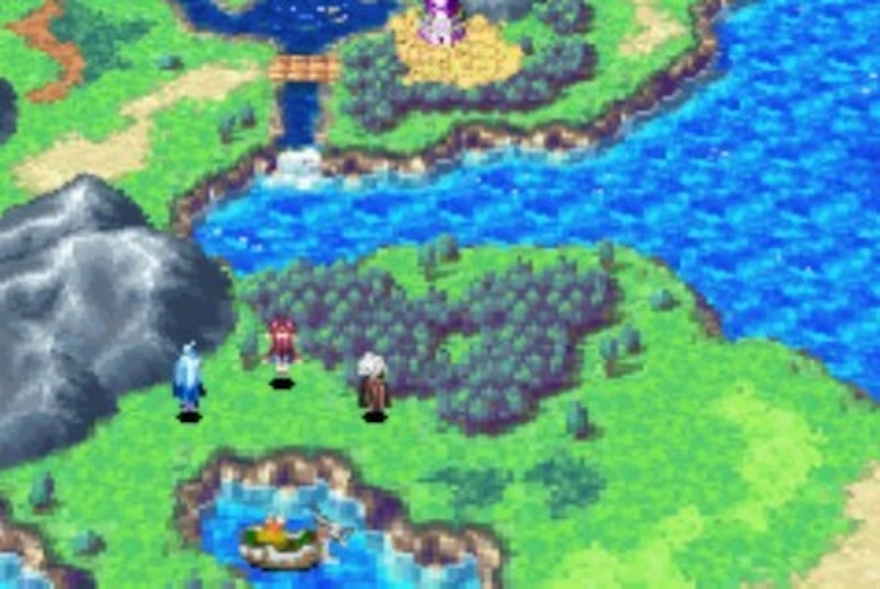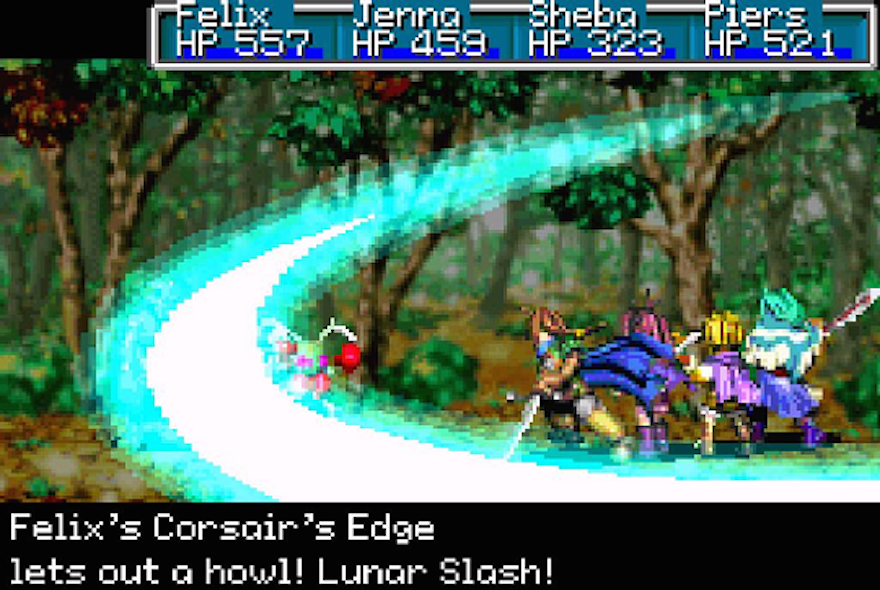My father always says there are two sides to every story. There’s one party’s side, the opposing party’s side, and then the truth tends to fall somewhere in the middle.
Most videogames, however, exist in a vacuum of storytelling, where the player takes control of a set of heroes out to destroy a set of bad guys. Through this, they mostly attempt to capture and tell only one side of a story. Mario is good, and Bowser is bad. Sora wants to save the world, the Heartless want to destroy it. Link is the Hero of Time, Ganon the bringer of destruction. It’s a repeated formula because it’s easy (and because it works), but it also tends to make things somewhat superficial and obvious.
Golden Sun, the 2001 Game Boy Advance role-playing-game from Nintendo, then, manages to pull off something that not a lot of videogames are able to do: take a look at both sides of a story and use it to explore the complexities of real-world morality.
The first two entries in the series, Golden Sun and Golden Sun: The Lost Age, together tell one complete story, but halfway through pull the narrative rug out from underneath the player. In The Lost Age, the player takes control of the antagonists from the first game, and the story from there delves into deeper ideas of morality, right and wrong, and starts to make the player wonder which side the “good guys” are on.
Golden Sun takes place in Weyard, a world kept in balance by the four basic elements of Alchemy: Venus (Earth), Mercury (Water), Jupiter (Wind), and Mars (Fire). Years before the game begins, the powers to control Alchemy were sealed away in an attempt to keep the world safe. Now, a rogue group of Adepts — the name for the in-game characters who can control the elements and have magical abilities — is attempting to relight the Elemental Lighthouses and break the seal on Alchemy, releasing its untold power unto the world.
This is all fairly standard Japanese role-playing game stuff, but, after spending the entire first game on a quest to prevent this from happening, the sequel deconstructs the player’s notion of right and wrong. You play as Felix, one of the antagonists from the first game, in an attempt to light the lighthouses, opposing the goal you tried to accomplish in the first game.

Slowly, more and more information about Weyard is revealed. Felix and his companions visit towns that are actually suffering from the lack of having the lighthouses enflamed. Lemuria—the ancient civilization based on the Atlantis-like myth—is in a state of continual decline, with the once rich civilization now devoid of its enthusiasm and creativity. (There’s also a not-so-subtle metaphor here: the leader of the Lemurian senate is named Lord Conservato, who is trying to keep things exactly the way they are).
Compare Lemuria with your visit to Izumo, a town that is on the verge of offering human sacrifices to a giant dragon that was awoken due to the player’s actions in the first game. For any area in the world that may have seemed to be better off with Alchemy restored, the second installment shows the other side, with other civilizations wrestling with the dire consequences of the player’s original actions.
The biggest reveal is saved for the end, though. The last location in the game is the frozen wasteland of Prox, home to the Fire clan that has been the “enemy” for most of the game. You learn that Felix’s parents aren’t dead; they have been held hostage in exchange for Felix’s cooperation. He was out to save his parents this whole time, not out of any selfish greed or lust for power.
As you explore Prox, you discover that the only reason the members of the clan set out to return Alchemy to the world is because their northern-most continent is slowly being destroyed, and that the whole world is moving closer and closer to the overflowing edges of the planet. (Like early maps of Earth, Weyard is flat, with giant waterfalls surroundings its edges).
A strong sense of self-preservation, not world domination, has been moving the characters, cast as enemies, over the past two games. It paints them in a much different light than average videogame “bad guys.” Can the player accept the actions of the Fire Clan if they were done in an attempt to save their town and villagers (and by extension, its children and elderly) from destruction? Do the ends justify the means?
The ultimate decision boils down to this: If the Lighthouses are relit, then the world will stop decaying, but also might be destroyed in the resulting cataclysm. But if the lighthouses aren’t lit, then the world most definitely will be destroyed.
It’s a surprisingly dark take on morality and mortality, implying that the act of making a decision can be more important than blindly accepting a predestined fate. On the other hand, to make no decision is to condemn entire races and villages to certain death.

There’s no clear right or wrong. No clear “videogame trope” of which side is the “hero.” Even as the characters go to light the last lighthouse beacon, they are stopped by The Wise One, a god-like deity who originally tasked them with stopping the lighthouses from being lit. Even with the characters’ resolve to not let the world end, The Wise One attempts to stop them, claiming that the world will end either way: “It is inevitable. In time, one man will seek to rule over all. It is human nature, inescapable.”
Even then, the game even asks the player directly, in a simple Yes or No prompt that appears on screen, if risking this is worth saving entire villages over. The characters ultimately choose to oppose the Wise One, and take the fate of the world into their own hands. The Wise One then reanimates the player’s previously missing parents into a giant dragon that they have to kill in order to save the world. It’s grim stuff.
The results of the decision to light the Lighthouses is even further explained in the sequels, as the rest of the world has to deal with the actions of a few children. To some, they are heroes, but to others, they were help not asked for, returning a power back to the world that not everybody wanted.
But the world was saved. Weyard continues to exist, even with the power of the elements unleashed. However, in the process of unleashing these elements, the normal videogame role of hero is redefined. The player receives a much more complex look at the characters through the shifting viewpoint of the characters. Golden Sun succeeds in raising interesting questions about the human condition. How will a person’s upbringing and background affect their viewpoint, and what is the right choice when faced with the complex moral decisions of real life? There’s at least two sides to every story, and Golden Sun thoroughly investigates this.
And in that sense, Golden Sun presents players with a reality that transcends the game. Sometimes there aren’t right answers. Life isn’t as easy as black and white, and sometimes even the best of intentions can cause the worst of outcomes. It’s a hard lesson, but one that Golden Sun, despite its bright name, manages to get across, well, adeptly.
Golden Sun and Golden Sun: The Lost Age are available to play on the Wii U Virtual Console.
